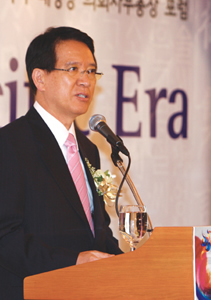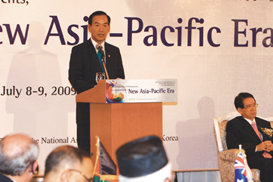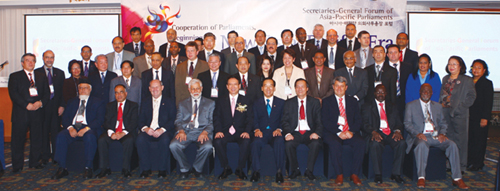SGFAPP Founded to Usher in Era of Parliamentary Cooperation in Asia-Pacific
More than 80 delegates assemble for the inaugural session held in Seoul from July 8-9

 Representatives of 42 assembly secretariats from 32 countries, including Korea, Japan, China, Turkey and Australia, got together in Seoul from July 8-9 to inaugurate the Secretaries-General Forum of Asia-Pacific Parliaments (SGFAPP) with the goal of strengthening the parliamentary network of the Asia-Pacific region.
Representatives of 42 assembly secretariats from 32 countries, including Korea, Japan, China, Turkey and Australia, got together in Seoul from July 8-9 to inaugurate the Secretaries-General Forum of Asia-Pacific Parliaments (SGFAPP) with the goal of strengthening the parliamentary network of the Asia-Pacific region.
The inaugural forum, held under the theme "Cooperation of Parliaments, Beginning of a New Asia-Pacific Era,"was attended by 83 delegates, including about 40 of the secretary-general-level. Among the participants were Korean National Assembly Secretary-General Park Kye-dong; Australian House of Representatives Clerk Ian C. Harris; Russian State Duma Secretary-General Alexey A. Sigutkin; Turkish Grand National Assembly Secretary-General Ali Osman Koca; and Ikuo Idaka, director-general of international affairs at the Japanese House of Councilors.
It is noteworthy that the forum was the first official meeting of parliamentary secretaries-general in the Asia-Pacific region designed to find ways of promoting cooperation.
Following the two-day session, the participating secretaries-general adopted the Seoul communiqu'e for the beginning of a new Asia-Pacific era through parliamentary cooperation.
The communiqu'e said, "The Asia-Pacific region, home to half of the world's population, is playing a key role in facilitating global economy development with diverse political systems, socio-cultural backgrounds and the world's most dynamic market, and taking note of this development, the forum agreed that the role and cooperation of Asia Pacific countries is crucial to resolving such issues as the economic crisis, climate change and poverty." Noting the need for systematic and continuous exchanges among Asia-Pacific parliaments to propose the vision of a new regional community, it said, "secretaries-general expressed their sincere hopes that the forum would serve as a venue for close cooperation and communication." "Observing that e-parliament facilitates the way for the public to access information amidst a new political and cultural environment in the rapidly changing era of informatization, the forum agreed to continue to cooperate and share experiences in order to develop into a mature democracy." according to the communiqu'e.
The Korean National Assembly secretary-general said in his opening speech that there was a lack of parliamentary cooperation in the Asia-Pacific region, so the forum was created to serve as a venue for parliamentary exchanges in order to address global issues, including diseases and environmental problems.
In his commemorative message, Speaker Kim Hyong-o, of the Korean National Assembly, also called for sharing experiences in e-parliament and closer parliamentary cooperation and exchanges amid the diversification of the international order.
The presenters of Session I, held at the Lotte Hotel in downtown Seoul on July 8, were Gherardo Casini, executive coordinator of the Global Center for ICT in Parliament; Cyitatire Sosthene, secretary-general of the Senate of Rwanda; Hapuarachchige Mahesh Perera, director of Information Systems & Management Department Of the Parliament of Sri Lanka; the Turkish secretary-general Koca; Suiunbek Kasmambetov, secretary-general of the Supreme Council of Kyrgyzstan; and Korean National Assembly Secretary-General Park.
Park, who was earlier elected chairman of the forum, spoke on the theme "Promoting e-Democracy in the Asia-Pacific Region."He focused on the present and future plans of the e-parliament of the ROK and proposals to promote e-democracy in the Asia-Pacific region through inter-parliamentary information and communication technologies (ICT) projects such as the e-Parliament Assistance Initiative (PAI).
Park said, "We came up with the idea of e-PAI last year to share our know-how and IT infrastructure in developing e-parliament."He continued, "We started the project with Cambodia last year-end, and since then, we have worked with the parliaments of Nepal, Laos, Uzbekistan, Kyrgyzstan, Tadzhikistan, Ethiopia, Rwanda and Tanzania to provide necessary assistance." "I believe that the computers donated to the parliaments will be the seeds for vibrant e-democracies in the future. To that end, without being complacent, we plan to link the e-PAI with inter-governmental exchanges and cooperation projects so that we can upgrade the extent and quality of the initiative." "Also under consideration is an expansion of technology cooperation to provide and maintain software for a digital chamber and parliamentary information system. We will be committed to sharing our experiences and know-how to facilitate e-parliament initiatives in other parliaments,"Park said.
Casini, the executive coordinator of the Global Center for ICT in Parliament, presented a paper titled "The Contribution of e-Parliament to Democracy."Casini said, "The Internet has become an important global resource, critical to both developed and developing countries in their quest to expand economic and social opportunities for all. New information and communication technologies have been adopted for different purposes: by individuals and communities to make their voices heard; by businesses and institutions to compete in the global economy; by public governance authorities to innovate and better serve their citizens. In sum, they are being used as a means to make political, business and technical processes more effective and efficient." "At the same time, it is also clear that these technologies have been helping public governance authorities to respond to the international calls for higher standards of accountability, transparency and participatory governance as critical elements of democracy and state legitimacy,"he said.
"The impact of new technologies on the political sphere is at an early stage, but its potential can already be glimpsed as the ever-broadening range of opportunities made available by ICT gives citizens the chance to intervene actively in several ways and break the silence between one election and the next,"he said.
"Clearly, the emergence of the information society presents both opportunities and challenges for parliaments as it seeks to affirm itself as a vital democratic institution of the 21st century,"Casini said.
In the afternoon following Session I, the delegates toured the Korean National Assembly and witnessed a demonstration of the operation of its e-parliament, including a digitalized floor and parliamentary televising via the Internet and e-library. Korea's e-parliament has already received a resounding recognition as the Korean parliamentary delegation presented it during the meetings of the Association of Secretaries-General of Parliaments, which coincided with the Inter-Parliamentary Union (IPU) Assembly in Addis Ababa this past April. The SGFAPP delegates showed a keen interest in the operation of the Korean e-parliament, which opened in 2005 and now becomes an example of a global e-parliament.
The delegates attended Session II on the responses to changes in the parliamentary legislation environment on July 9 before heading out for industrial observation tours on July 10-11. nw
National Assembly Speaker Kim Hyong-o delivers a commemorative speech at the inaugural Secretaries-General Forum of Asia-Pacific Parliaments (SGFAPP).
Korean National Assembly Secretary-General Park Gye-dong speaks at the inaugural session of SGFAPP held in Seoul on July 8.
The participants of the inaugural session of SGFAPP pose for a group photo.
3Fl, 292-47, Shindang 6-dong, Chung-gu, Seoul, Korea 100-456
Tel : 82-2-2235-6114 / Fax : 82-2-2235-0799